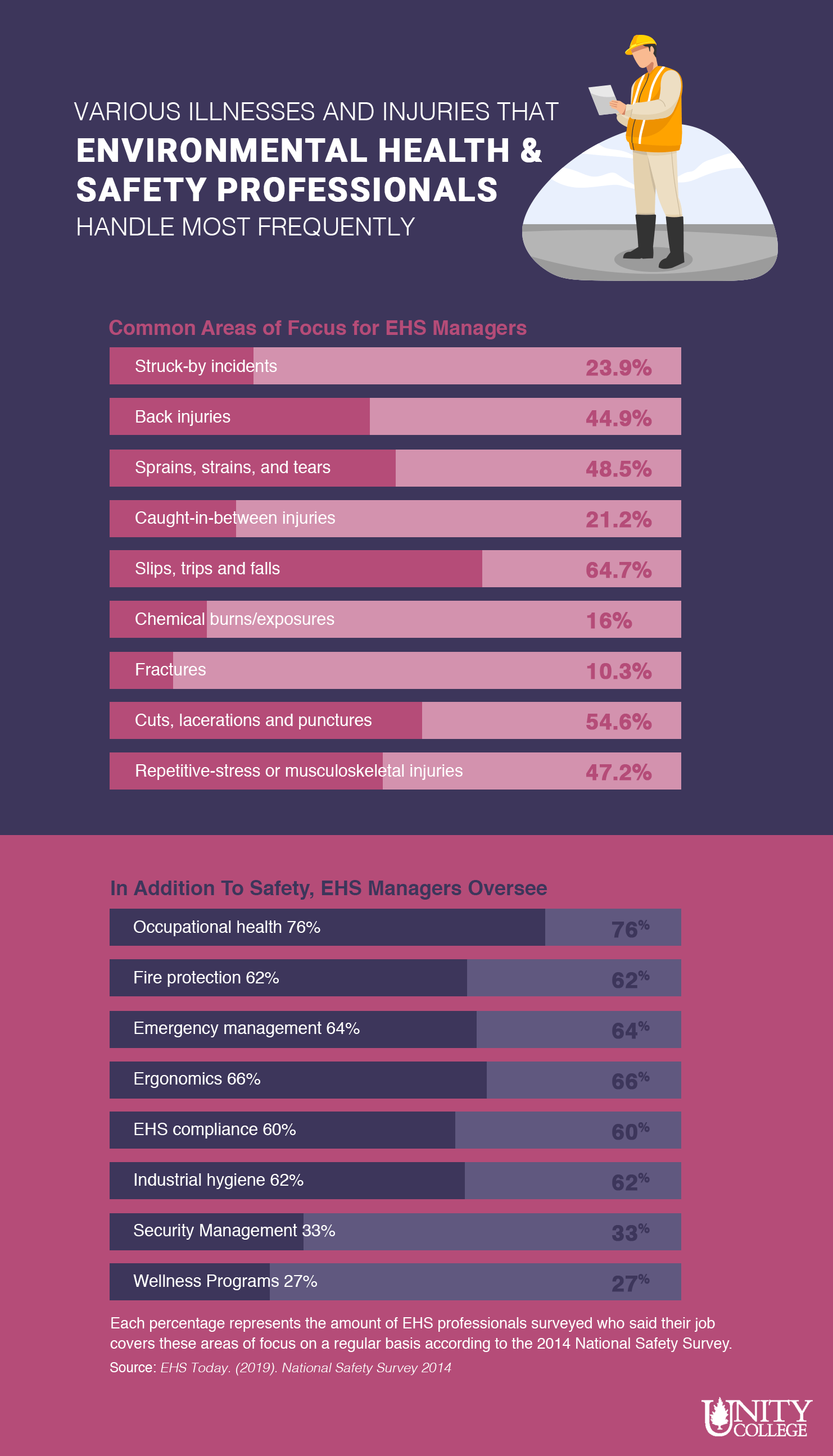- Fast Facts
- What is an EHS Manager?
- Key Tasks & Duties
- Work Environments
- Salaries
- Job Outlook & Growth Rate
- Educational Requirements
- Related Degrees

What is a Safety Manager?
Environmental Health and Safety is a vast and vague category. Some job descriptions suggest that the field is concerned with the assurance of the quality of public spaces for human use. Other times, the description focuses more on the regulation and management of the natural environment.
According to the Institute for Safety and Health Management, Environmental Health and Safety (EHS) is concerned with the development of a “systematic and organized approach to following and complying [with] environmental regulations, managing waste and/or reducing the business’ carbon footprint.”
With this considered, an EHS manager supervises the planning and execution of all health and safety programs in the company with which they are employed. The EHS manager is responsible for the safety of company employees and the company’s compliance with environmental regulations.
They are also responsible for the procedural details of potentially dangerous work duties and ensuring that employees are aware of safety protocols and continuous employee training.
What Do Environmental Health and Safety Managers Do?
An Environmental Health and Safety Manager is tasked with acting on behalf of a company or institution, specifically with regard to the promotion of safe, professional work practices and conditions that are in compliance with environmental policies and regulations.
EHS managers are similar to Environmental Public Health and Environmental Policy and Planning professionals. However, the key difference is that EHS managers work in direct communication with the organizations/institutions/entities that are affected by environmental legislation.

An aspiring EHS manager needs to be inclined to detail, have strong observational skills, and should have a thorough knowledge of environmental law. They also need to work well under pressure, as they will be directly involved in potentially dangerous or high-stress situations. This might include conducting investigations into workplace injuries or being called upon as a witness in possible persecution.
Junior Environmental Health and Safety Managers Duties
An entry-level EHS manager needs significantly less experience and education than a senior or supervisory EHS manager. However, they have slightly similar job duties on different levels of authority and communication. Here is an example of a junior environmental health and safety manager job description:
- Develop mechanisms for the improvement of key safety programs
- Encourage standardization of safety policies
- Build comprehensive management systems to keep track of metrics related to compliance and performance while aiming for continuous improvement
- Work as a subject matter expert for health and safety
- Provide technical advice to stakeholders that work with the company
- Conduct gap analyses for the improvement of company training programs
Even on an entry-level, the EHS manager is heavily involved with training and oversight of company employees as it relates to environmental safety. They also function as a direct line of communication between stakeholders and the company with which they work.
Senior Environmental Health and Safety Managers Duties
A senior EHS manager has similar duties as the junior EHS manager, but they work on a higher level of authority and have additional responsibilities along with employee management and stakeholder communications.
- Partner with [company and stakeholder] leadership and serve as a subject matter expert (SME) regarding the interpretation of federal, state, and local EHS regulations
- Align corporate and local EHS goals and strategies
- Lead, develop, and manage local EHS staff members
- Lead EHS audits and inspections developing remediation plans as needed
- Lead multimedia environmental compliance workshops on water, waste, and air
- Build and maintain positive relationships with federal, state, and local regulators
- Lead a continuous improvement initiative regarding EHS policies and programs
- Manage budgets
- Ensure compliance with all relevant federal, state, and local EHS regulations
- Lead employee training programs regarding EHS-approved behaviors and general compliance
One of the key differences is that the senior EHS manager is more heavily involved with the development and maintenance of relationships with political authorities and stakeholders. They are also more concerned with employee education and compliance with EHS standards and policies on all levels of government.
Where Do Environmental Health and Safety Managers Work?
Environmental Health and Safety managers almost always work on a full-time basis. However, they do have the option of working either as a permanent employee or a contractor who responds to business needs as they arise.
EHS managers can work with a wide variety of institutions, from universities to environmental consulting firms and the federal government.
Federal research organizations like the Environmental Protection Agency (EPA) and the National Oceanic and Atmospheric Association (NOAA) are known to need environmental health and safety managers.
Environmental Health and Safety Manager Salary
According to the Bureau of Labor Statistics (BLS), the average annual salary of environmental scientists and specialists (including EHS managers) was $71,130 in 2018. The EHS managers who found themselves in the lowest 10% of those surveyed earned less than $42,520, whereas the highest 10% earned more than $124,620.
According to industry, here are the general divisions of EHS manager salary:
- Federal government: $103,440
- Engineering services: $72,100
- Management, scientific, and technical consulting services: $70,000
- Local government: $67,500
- State government: $64,600
Junior Environmental Health and Safety Manager Salary
A junior or entry-level position in environmental health and safety can expect a salary of at least $42,000 per year.
Senior Environmental Health and Safety Manager Salary
A senior EHS manager, on average, can make anywhere between $73,000-124,600 per year.
How much does a safety manager make? This depends in large part on their educational background. Those applicants that hold an EHS master’s degree, for example, will earn a higher salary than others who have a bachelor’s.
Environmental Health and Safety Job Outlook
There will always be a need for EHS managers in nearly all industries. It was reported that, in 2018, approximately 98,000 EHS managers were employed in the U.S. That number is expected to grow by about 6,300 jobs in the next 10 years, at an average rate of 4-6%. Given the expected growth, this job outlook does not appear competitive.
Health and Safety Manager Educational Requirements
Aspiring EHS managers should earn at least a bachelor’s degree in chemical engineering, business, industrial management, or related disciplines. Of course, an environmental health and safety degree is ideal if you are able to locate such a program. A master’s degree in Occupational Health and Safety, Engineering, or other related disciplines will strengthen your qualifications even more.
If you’re pressed for time and finances, one of the best options you can take when fulfilling these EHS manager requirements is to pursue your EHS degree online. Not only will this save you time and money, but it will also make your schedule more flexible. This allows you to have the chance to simultaneously earn or participate in any of the following:
- Environmental health and safety training courses
- Environmental health and safety manager training
- EHS manager certification
High School Recommendations
To get an early start on the educational requirements of a health and safety manager career path, it is recommended that in high school you take classes in environmental sciences and focus on mathematics such as geometry, trigonometry, and calculus.
Additionally, any roles that require leadership and delegation would do well to strengthen your resume and give you an early start in developing your professional reputation regarding leadership capabilities.
Undergraduate Requirements
The vast majority of EHS managers have a bachelor’s degree, and the primary fields of knowledge include:
- Chemistry
- Political science
- Mathematics
- Biology
- Engineering
- Physics
- Computer science
- Psychology
An obvious addition to this list would be a Health and Safety degree or, more specifically, an EHS degree.
There is no standardized specification on the number of years for the desired undergraduate education. However, a four-year undergraduate education is typically the strongest educational background, especially if it is the only advanced degree you have on your resume.
Postgraduate Requirements
A very small percentage of EHS managers have much higher than a bachelor’s degree. For those that want to go the extra mile and be sure to beat out the competition, an EHS master’s degree, a master’s degree in Occupational Health and Safety, engineering, environmental sciences, and/or political sciences would be best.
EHS degree programs are quite uncommon to find on many U.S. campuses. Thus, if you intend to go for your EHS master’s degree, then you may want to opt for an Environmental Health and Safety Degree online.
As was the case with the undergraduate programs, with an online program, you can maintain a full- or part-time student status as an Environmental Health and Safety major while obtaining additional certifications and training to strengthen your qualifications.
Work Experience for Environmental Health and Safety Managers
The average expectation for work experience is at least seven years of environmental health and safety-related work (i.e. OSHA/EPA manufacturing environments).
However, you can find your way into an entry-level position with only 1 to 3 years of related internship experience. If this is not readily accessible, then you can opt for specialized training instead.
Related EHS Degree Programs
Consider these undergraduate degree paths at Unity College to prepare for your career as an Environmental Health and Safety Management:
- B.S. Environmental Science and Climate Change – Learning through the lens of climate change adaptation and mitigation, this program will allow students to step into enriching careers that make a difference.
- B.S. Environmental Studies – Students will draw skills and knowledge from a variety of fields to become some of the world’s leading environmental innovators, leaders, and thinkers.



